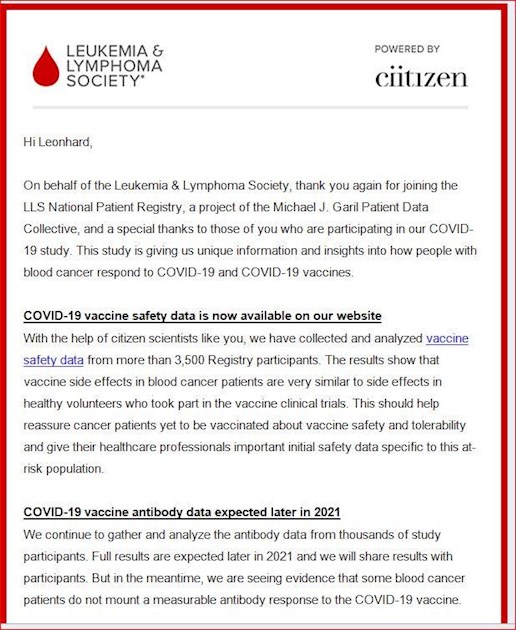On behalf of the Leukemia & Lymphoma Society, thank you again for joining the LLS National Patient Registry, a project of the Michael J. Garil Patient Data Collective, and a special thanks to those of you who are participating in our COVID-19 study. This study is giving us unique information and insights into how people with blood cancer respond to COVID-19 and COVID-19 vaccines.
COVID-19 vaccine safety data is now available on our website
lls.org/news/covid-19-vacci...
With the help of citizen scientists like you, we have collected and analyzed vaccine safety data from more than 3,500 Registry participants. The results show that vaccine side effects in blood cancer patients are very similar to side effects in healthy volunteers who took part in the vaccine clinical trials. This should help reassure cancer patients yet to be vaccinated about vaccine safety and tolerability and give their healthcare professionals important initial safety data specific to this at-risk population.
COVID-19 vaccine antibody data expected later in 2021
We continue to gather and analyze the antibody data from thousands of study participants. Full results are expected later in 2021 and we will share results with participants. But in the meantime, we are seeing evidence that some blood cancer patients do not mount a measurable antibody response to the COVID-19 vaccine.
The next step in this study is for participants who are more than three months from their final COVID-19 vaccination to have one additional follow-up blood test. These invitations will be sent at the beginning of each month to those who are due based on the date of their final COVID-19 vaccine. If you are part of this study, please watch for your invitation in the coming months.
A follow-up T-cell study is beginning in mid-June
Finally, we wanted to let you know about a follow-up study kicking off this month to assess another type of immune response to COVID-19 vaccines. This follow up study, which is invitation only, is looking at T-cell responses in a subset of people who are participating in the antibody study.
T-cells are the part of our immune system that create “killer cells,” another line of defense against infections like COVID-19. Because it is possible that people without antibody responses mount T-cell responses, we are inviting people with and without antibody responses to be part of this study. We are also inviting a diverse group representing a range of cancer diagnoses and treatments, as well people across a spectrum of age, gender, race and ethnicity. The total enrollment for the follow-up study is capped at 1,000.
Because T-cell testing is reserved for research purposes, we will not be able to provide individual T-cell results. If you are invited to join this trial, be assured your participation will help us gather vital information to improve care and safety of people like you. And, as always, we will share our findings with you as soon as they are available.
Invitations for this follow-up study will be sent soon. If you receive one, we hope you will strongly consider joining us.
An important note about COVID-19 Antibody and T-cell tests
Right now, we don't fully know what seronegative antibody tests mean, but what we've seen so far tells us that immunocompromised patients, including those with certain blood cancers or undergoing certain treatments, are different than the general population and may be at risk. This does NOT mean that vaccination is futile. It does mean blood cancer patients should continue to follow good prevention guidelines, including wearing masks, social distancing, frequent hand washing, avoiding crowds and poorly ventilated indoor spaces.
Once again, thank you for participating in our patient registry. Your participation will have far-reaching impact on improving care for everyone with blood cancer.
Sincerely,
The Leukemia & Lymphoma Society and Ciitizen
